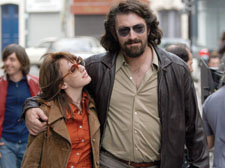|
|
 |
| |

Sylvia Jeanjacquot (Ludivine Sagnier) and Jacques Mesrine (Vincent Cassel) |
A Folk hero who fought capitalism? It’s a bit rich!
MESRINE: PUBLIC ENEMY NO1
Directed by Jean-Francois Richet
Certificate 18
JACQUES Mesrine kept France enthralled throughout the 1970s, and now, 30 years after his violent death at the hands of the Paris police, a bio pic has reignited the legend of the gangster whose audacious career and anti-authoritarian stance made him a poster boy for rebels fed up with the Fourth Republic.
Director Jean-Francois Richet used Mesrine’s own autobiography and split the tale into two parts: part one, Killer Instinct, tells of Jacques Mesrine (a perfectly cast Vincent Cassel), an Algerian campaign veteran who falls into the glamorous Parisian underworld and decides he fancies a gangster’s high life over an honest working-class existence.
The film, released earlier this summer, sets things up nicely for this concluding part.
We meet Jacques as he is back in police custody. But he escapes from a courtroom, taking a judge hostage, and is declared “Public Enemy Number One” by the French police who are now determined to stop him, at any cost.
The forces of law and order are led by the determined Commander Broussard. Broussard’s motivation to catch this bad guy is never really adequately covered his not insignificant part in Mesrine’s story is totally consumed by the director’s obvious fascination with his lead. We never see the police apart from them cowering behind cars or giving chase. We know simply that after Mesrine kidnapped an ageing slum landlord and then attempted to murder a right-wing journalist who had written things about him he did not like, the public began to realise he was simply a violent crook, and this gave the French police carte blanche to meet his violence with violence of their own.
Yet Mesrine was for a time a folk hero. His motivations are shown to be a railing against a world where lavish products split the world into haves and have-nots. He paints himself as a revolutionary, with a particular dislike of a brutal prison system he had first-hand experience of. But all this talk of anarchy and freedom was eye wash: he wanted a gold-painted BMW and jewels to hang around the neck of his wife, rather than to tear down the system.
His concept of freedom was not idealistic. While he often referred to other 1960s and 70s groups the OAS, who hated the loss of French Algeria, and Germany’s Baader Meinhof gang Mesrine’s ideals were based on the fact he resented the idea of having to work nine to five and still never enjoy the fruits of labour.
He justified armed robbery by saying banks were the real robbers, and while this anti-capitalism may seem laudable, the truth is (and is well pointed out here) he wanted the trappings of a rich man’s lifestyle, but just had no clue how to attain it, except through the use of extreme violence.
This film has many commendable attributes: the characters are believable; and the action is superb, each hair-breadth escape keeping you on the edge of your seat. It’s not glamorous, either – hearing French police officers describing how they feel “like shitting their pants” as they seek to apprehend the Public Enemy Number One hardly has a Starsky and Hutch feel to it.
Above all, Mesrine’s life tells us much about how an economically unjust society breeds criminals, and to make such a parable racy is a job well done.
|
 |
|
 |
| |
|
 |
|

